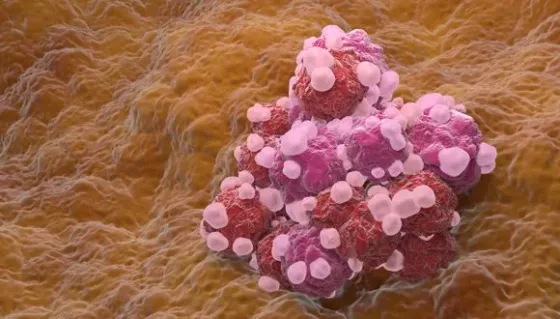Ovarian cancer ranks fifth in cancer deaths among women, accounting for more deaths than any other cancer of the female reproductive system. In a study conducted at Tel Aviv University researchers used protein CKAP5 (cytoskeleton-associated protein) for the first time as a therapeutic target for RNA-based nanodrugs. After identifying a genetically unstable mutation resistant to both chemotherapy and immunotherapy in the tissues of ovarian cancer, the researchers targeted these cells with lipid nanoparticles containing RNA for silencing CKAP5 – causing the cells to collapse and achieving an 80% survival rate in animal models.
“The lipid nanoparticles developed by Prof. Peer enabled us for the first time to silence [the CKAP5] protein through targeted delivery of an RNA drug. We proved that CKAP5, a protein responsible for the cell’s stability, can be silenced, and that this procedure collapses and destroys the entire cancer cell.” – Dr. Sushmita Chatterjee
Targeted Delivery of RNA Drug
The breakthrough was achieved by a TAU research team led by Prof. Dan Peer of The Shmunis School of Biomedicine and Cancer Research, a global pioneer in the development of RNA-based drugs, Head of the Laboratory of Precision Nanomedicine, and TAU’s VP for R&D; and by Dr. Sushmita Chatterjee, post-doctoral student from India at Prof. Peer’s lab, in collaboration with Prof. David Sprinzak of The George S. Wise Faculty of Life Sciences and Prof. Ronen Zaidel-Bar of the Sackler Faculty of Medicine. The study was funded by the Rivkin Foundation for Ovarian Cancer Research and the Shmunis Family Foundation. The results were published in the leading scientific journal Science Advances.
“The protein CKAP5 has never been studied with relation to the fight against cancer, simply because there was no known way to silence it,” explains Dr. Chatterjee. “The lipid nanoparticles developed by Prof. Peer enabled us for the first time to silence this protein through targeted delivery of an RNA drug. We proved that CKAP5, a protein responsible for the cell’s stability, can be silenced, and that this procedure collapses and destroys the entire cancer cell.”

Prof. Dan Peer
“Something Like a Dominoes Game”
At the second stage of the study the researchers tested the new CKAP5-silencing RNA drug on 20 types of cancer. Some cancer cells proved more sensitive than others to this procedure. Cancers displaying high genetic instability, which are usually highly resistant to chemotherapy, were found to be especially sensitive to the silencing of CKAP5.
“As researchers, we are involved in something like a dominoes game: we always look for the one piece in the cancer’s structure that is so important, that if we pull it out the entire cell will collapse. CKAP5 is such a domino piece, and we are already working on more applications (…)” – Prof. Dan Peer
“All cancer cells are genetically unstable,” says Dr. Chatterjee. “Otherwise, they would be healthy, not cancerous. However, there are different levels of genetic instability. We found that cancer cells that are more unstable, are also more affected by damage to CKAP5. Our drug pushed them to their limit, and essentially destroyed their structure. Our idea was to turn the trait of genetic instability into a threat for these cells, by using RNA to silence the flawed protein. We demonstrated for the first time that CKAP5 can be used to kill cancer cells, and then observed the biological mechanism that causes the cancer cells to collapse in the protein’s absence.”
Equipped with these insights, the researchers tested the new drug in an animal model for ovarian cancer, achieving a survival rate of 80%.
“We chose ovarian cancer because it’s a good target,” explains Prof. Peer. “While highly resistant to both chemotherapy and immunotherapy, this type of cancer is very sensitive to the silencing of CKAP5. It should be emphasized that the CKAP5 protein is a new target in the fight against cancer. Targeting cell division is not new, but using RNA to target proteins that make up the cell’s skeleton (cytoskeleton) – this is a new approach and a new target that must be further investigated. As researchers, we are involved in something like a dominoes game: we always look for the one piece in the cancer’s structure that is so important, that if we pull it out the entire cell will collapse. CKAP5 is such a domino piece, and we are already working on more applications, this time in blood cancers.”









